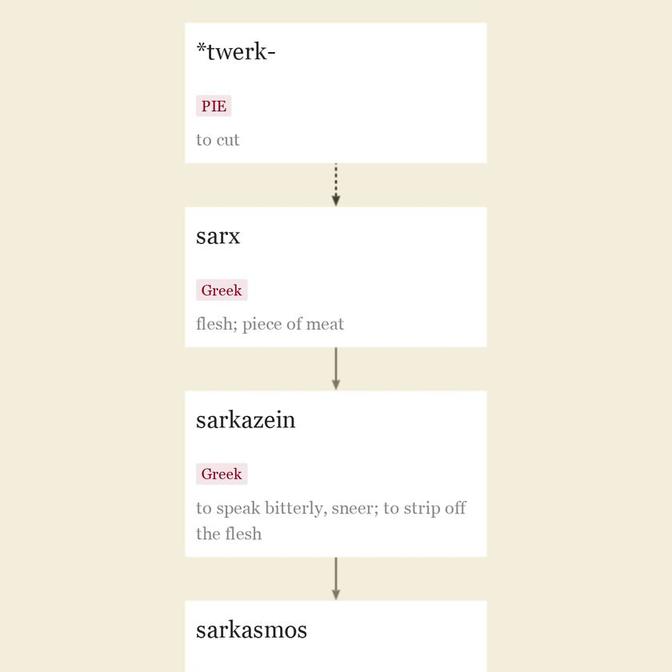sarcomere (n.)
"肌肉的结构单位",1891年,源自 sarco-,希腊语 sarx 的拉丁化组合形式,意为"肉体"(参见 sarcasm)+ -mere,源自希腊语 meros 的"部分",源自 PIE 词根 *(s)mer-(2)的"分享某物的一部分"。
最早记录年份: 1891
sarcomere 的相关词汇
*(s)mer- (2)
原始印欧语根,意为“分享某物的一部分”。
它构成或部分构成以下单词: demerit; emeritus; isomer; isomeric; meretricious; merism; meristem; merit; meritorious; mero-; monomer; Moira; polymer; turmeric。
它是假设的源头,其存在的证据由以下提供:希腊语 meros “部分,份额”, moira “份额,命运”, moros “命运,宿命,厄运”; 赫梯语 mark “分割”祭品; 拉丁语 merere, meriri “赚取,值得,获得”。
sarcasm (n.)

1570年代, sarcasmus,“尖刻的嘲讽或讥讽,讽刺的话或表达”,源自晚期拉丁语 sarcasmus,来自晚期希腊语 sarkasmos,“嘲笑,戏谑,讥讽,嘲弄”,来自 sarkazein,“说话刻薄,嘲笑”,字面意思是“剥去肉”(像狗一样),来自 sarx(属格 sarkos)“肉”,本意是“一块肉”(参见 sarco-)。英语单词的现代形式来自1610年代。“现在通常指:讽刺的语言; 讽刺的意义或目的”[OED]。另见 humor(名词)。
The essential thing about sarcasm is its cutting edge ; it therefore is intensely concentrated, lying in a sentence or a phrase ; it is used to scourge the follies or foibles or vices of men, but has little of reformatory purpose. Satire is more elaborate than sarcasm, is not necessarily bitter, and has, presumably, some aim at the reformation of that which is satirized. [Century Dictionary]
sarcasm 的本质在于其尖锐的切割边缘; 因此它非常集中,存在于一个句子或短语中; 它用于抨击人们的愚蠢、缺点或恶习,但几乎没有改革的目的。Satire 比 sarcasm 更为复杂,不一定是苦涩的,而且据说有一些目的是改革被讽刺的东西。[世纪词典]